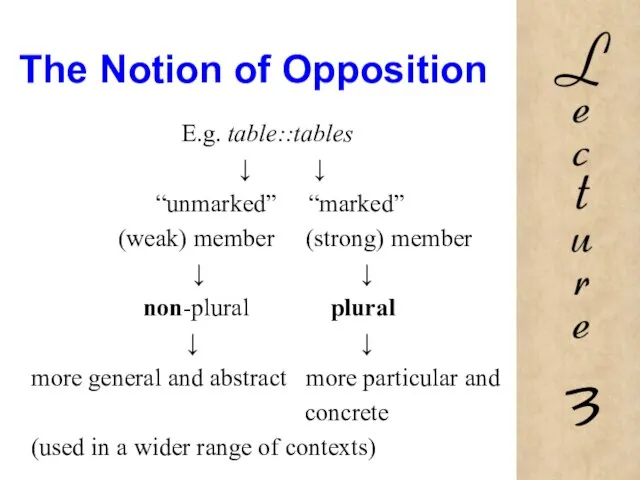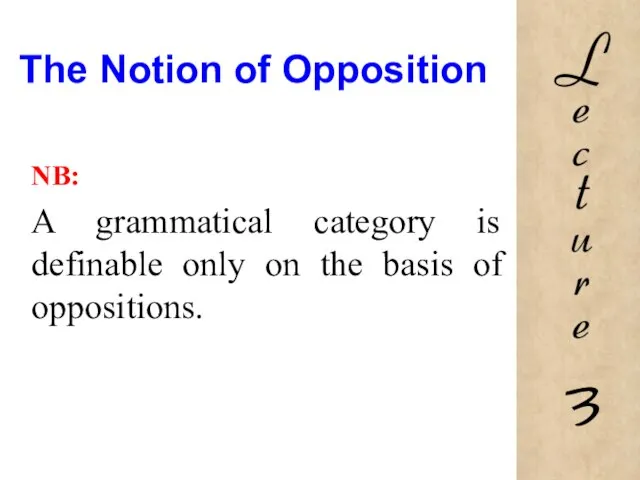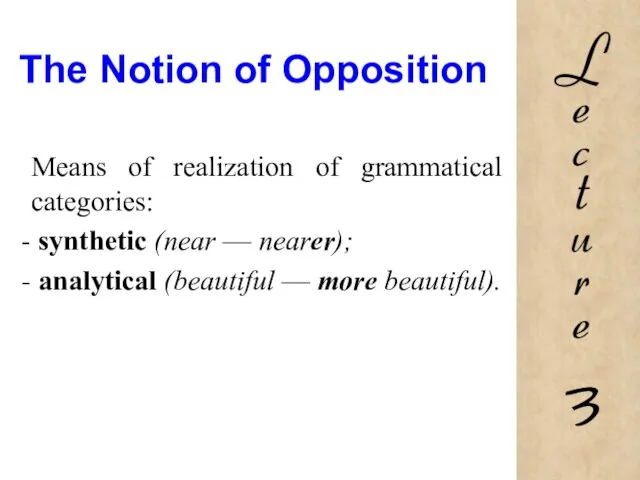Содержание
- 2. 1. The problem of word definition. 2. The notion of the word-form. 3. The notion of
- 3. 1.The Problem of Word Definition The word is considered to be the central (though not the
- 4. The Problem of Word Definition In the written language words are clearly identified by spaces between
- 5. The Problem of Word Definition In the spoken language the problem cannot be solved this way.
- 6. The Problem of Word Definition Approaches to the problem of word definition: the word is a
- 7. The Problem of Word Definition Semantic definition of the word: “…a unit of a particular meaning
- 8. The Problem of Word Definition BUT: heavy smoker ≠ heavy and smoker criminal lawyer; the King
- 9. The Problem of Word Definition The problem: the word is not always a single unit.
- 10. The Problem of Word Definition A phonological criterion that stuff that’s tough a nice cake an
- 11. The Problem of Word Definition It is hard to distinguish the real meaning without a proper
- 12. The Problem of Word Definition The word as an indivisible unit “The word is a minimum
- 13. The Problem of Word Definition BUT: a or the
- 14. The Problem of Word Definition Thus, the word is a linguistic unit larger than a morpheme
- 15. The Problem of Word Definition In this case the word can be defined as: • An
- 16. The Problem of Word Definition • A phonological word (something pronounced as a single unit).
- 17. The Problem of Word Definition • A lexical item, or lexeme, (a dictionary word).
- 18. The Problem of Word Definition • A grammatical word-form (GWF) (or morphosyntactic word) (any one of
- 19. The Problem of Word Definition The item ice cream is: two orthographic words, but - a
- 20. The Problem of Word Definition The singular dog and the plural dogs: - a single orthographic
- 21. The Problem of Word Definition ??? take, takes, took, taken, is taking:
- 22. The Problem of Word Definition take, takes, took, taken and is taking: - five orthographic words,
- 23. The Problem of Word Definition ??? the contraction hasn't
- 24. The Problem of Word Definition The contraction hasn't is: - a single orthographic word, a single
- 25. The Problem of Word Definition ??? The phrasal verb make up (as in She made up
- 26. The Problem of Word Definition The phrasal verb make up (as in She made up her
- 27. The Problem of Word Definition ??? make up (She made up a story)
- 28. The Problem of Word Definition make up (She made up a story): - a different lexical
- 29. The Problem of Word Definition So, the word is not a clearly definable linguistic unit.
- 30. The Problem of Word Definition For the sake of linguistic description, we will proceed from the
- 31. The Problem of Word Definition - the word is the main expressive unit of human language,
- 32. The Problem of Word Definition the word It is also the basic nominative unit of language
- 33. The Problem of Word Definition in the structure of language the word belongs to the upper
- 34. The Problem of Word Definition the word is a unit of the sphere of "language" and
- 35. The Problem of Word Definition one of the most characteristic features of the word is its
- 36. The Problem of Word Definition the word is a bilateral entity concept WORD = --------------------- sound
- 37. 2. The Notion of the Word -Form The term "word-form“ shows that the word is a
- 38. The Notion of the Word -Form Grammatical meanings of a word-form are very abstract and general.
- 39. The Notion of the Word -Form E.g.: the meaning of the plural is rendered by the
- 40. The Notion of the Word -Form Due to the generalized character of the plural, we say
- 41. The Notion of the Word -Form Cf.: faces, branches, matches, judges; books, rockets, boats, chiefs, proofs;
- 42. The Notion of the Word -Form The lexical meaning of the word is irrelevant for the
- 43. The Notion of the Word -Form A word-form may be analytical by structure. In this case
- 44. The Notion of the Word -Form Words (as well as morphemes) are directly observable units by
- 45. The Notion of the Word -Form The system of morphological units is a closed system. It
- 46. The Notion of the Word -Form Every word is a unit of grammar as a part
- 47. The Notion of the Word -Form Parts of speech are usually considered a lexico-grammatical categories since:
- 48. 3. The Notion of Grammatical Meaning Notional words combine two meanings in their semantic structure: lexical;
- 49. The Notion of Grammatical Meaning Lexical meaning is the individual meaning of the word E.g.: table
- 50. The Notion of Grammatical Meaning Grammatical (morphological) meaning is not individual. ↓ It is the meaning
- 51. ? What are grammatical meanings of: - verbs; adjectives; adverbs?
- 52. The Notion of Grammatical Meaning There are some classes of words that are devoid of any
- 53. ??? What are they?
- 54. The Notion of Grammatical Meaning Function words
- 55. 4.Types of Grammatical Meaning The grammatical meaning may be: explicit; implicit.
- 56. Types of Grammatical Meaning The implicit grammatical meaning is not expressed formally E.g.: table (the meaning
- 57. Types of Grammatical Meaning The explicit grammatical meaning is always marked morphologically E.g.: -s in cats
- 58. Types of Grammatical Meaning Types of the implicit grammatical meaning: general dependent
- 59. Types of Grammatical Meaning general (the meaning of the whole word-class, of a part of speech)
- 60. Types of Grammatical Meaning dependent (the meaning of a subclass within the same part of speech)
- 61. Types of Grammatical Meaning The dependent grammatical meaning influences the realization of grammatical categories restricting them
- 62. Types of Grammatical Meaning
- 63. 5. The Notion of Grammatical Category A grammatical category is a linguistic category which has the
- 64. The Notion of Grammatical Category Its structure displays two or more forms applied to a definite
- 65. The Notion of Grammatical Category Grammatical categories are made up by the unity of identical grammatical
- 66. The Notion of Grammatical Category Due to dialectal unity of language and thought, grammatical categories correlate,
- 67. The Notion of Grammatical Category Thus, grammatical categories are references of the corresponding objective categories. E.g.:
- 68. The Notion of Grammatical Category Grammatical categories that have references in the objective reality are referential.
- 69. The Notion of Grammatical Category Grammatical categories that do not correspond to anything in the objective
- 70. The Notion of Grammatical Category Classifications of Gr. Categories According to the referent relation: immanent; -
- 71. The Notion of Grammatical Category Immanent gr. categories are: 1) innate for a given lexemic class,
- 72. The Notion of Grammatical Category Reflective gr. categories are of a secondary, derivative semantic value E.g.:
- 73. The Notion of Grammatical Category 2. According to the changeability of the exposed feature - unchangeable
- 74. The Notion of Grammatical Category NB: 1. The notion of grammatical category applies to the plane
- 75. The Notion of Grammatical Category 2. It refers to grammatical meaning as a general notion;
- 76. The Notion of Grammatical Category 3. It does not nominate things but expresses relations, that is
- 77. The Notion of Grammatical Category 4. Grammatical categories of language represent a realization of universal categories
- 78. The Notion of Grammatical Category 5. Grammatical categories are not uniform, they vary in accordance with
- 79. The Notion of Grammatical Category 6. The expression of grammatical categories in language is based upon
- 80. 6. The Notion of Opposition The concept of opposition is that it distinguishes something. ↓
- 81. The Notion of Opposition One thing can be distinguished from another only if it can be
- 82. The Notion of Opposition Any grammatical category must be represented by at least two grammatical forms
- 83. The Notion of Opposition Thus, the relation between two grammatical forms that differ in meaning and
- 84. The Notion of Opposition The most widely known opposition is the binary "privative" opposition. In it
- 85. The Notion of Opposition E.g. table::tables ↓ ↓ “unmarked” “marked” (weak) member (strong) member ↓ ↓
- 86. The Notion of Opposition FYI: Some scholars, however, hold the opinion that oppositions can be gradual
- 87. The Notion of Opposition NB: A grammatical category is definable only on the basis of oppositions.
- 88. The Notion of Opposition Means of realization of grammatical categories: synthetic (near — nearer); analytical (beautiful
- 90. Скачать презентацию























































































 Технологическое предпринимательство для школьников: от изобретения к бизнесу! Занятие 2
Технологическое предпринимательство для школьников: от изобретения к бизнесу! Занятие 2 Романская архитектура
Романская архитектура Выборы Лидера совета старшеклассников
Выборы Лидера совета старшеклассников Роботы в древней греции
Роботы в древней греции Функция
Функция Поисковое продвижение: как увеличить его эффективность?
Поисковое продвижение: как увеличить его эффективность? Рекламные решения
Рекламные решения Мегалитическая архитектура 8 класс
Мегалитическая архитектура 8 класс Планета дорог
Планета дорог Забота о ближнем - призвание христианина
Забота о ближнем - призвание христианина МОДЕЛИ ПЕДАГОГИЧЕСКОГО ОБЩЕНИЯ
МОДЕЛИ ПЕДАГОГИЧЕСКОГО ОБЩЕНИЯ Презентация на тему Правила поведения при пожаре
Презентация на тему Правила поведения при пожаре  Викторина по произведению А.С. Пушкина "Капитанская дочка"
Викторина по произведению А.С. Пушкина "Капитанская дочка" Конструирование и моделирование одежды
Конструирование и моделирование одежды Медиабезопасность
Медиабезопасность Агатэ Элерс, отдел Международного сотрудничества Услуги и опыт Немецкого Энергетического Агентства в реализации СО- и МЧР-проект
Агатэ Элерс, отдел Международного сотрудничества Услуги и опыт Немецкого Энергетического Агентства в реализации СО- и МЧР-проект ВСЕМ! ВСЕМ! ВСЕМ! 7 ФЕВРАЛЯ, В 17 ЧАСОВ ГИМНАЗИЯ № 3 ЖДЁТ СВОИХ ВЫПУСКНИКОВ
ВСЕМ! ВСЕМ! ВСЕМ! 7 ФЕВРАЛЯ, В 17 ЧАСОВ ГИМНАЗИЯ № 3 ЖДЁТ СВОИХ ВЫПУСКНИКОВ  Что нас окружает ?
Что нас окружает ? НИД кафедры ЭиУ в 2020/21 уч. году Проблемы, задачи, пути развития
НИД кафедры ЭиУ в 2020/21 уч. году Проблемы, задачи, пути развития Британские художники
Британские художники Год театра в России. Научно-практическая конференция
Год театра в России. Научно-практическая конференция Презентация3
Презентация3 Винтовые лестницы
Винтовые лестницы Экспорт нефти и нормативно-правовое регулирование
Экспорт нефти и нормативно-правовое регулирование Александрова Айталина Ивановна
Александрова Айталина Ивановна Готовность первоклассника к школе
Готовность первоклассника к школе Отклонение в поведении ребенка как социально-педагогическая проблема
Отклонение в поведении ребенка как социально-педагогическая проблема Презентация на тему Миграции населения России (8 класс)
Презентация на тему Миграции населения России (8 класс)